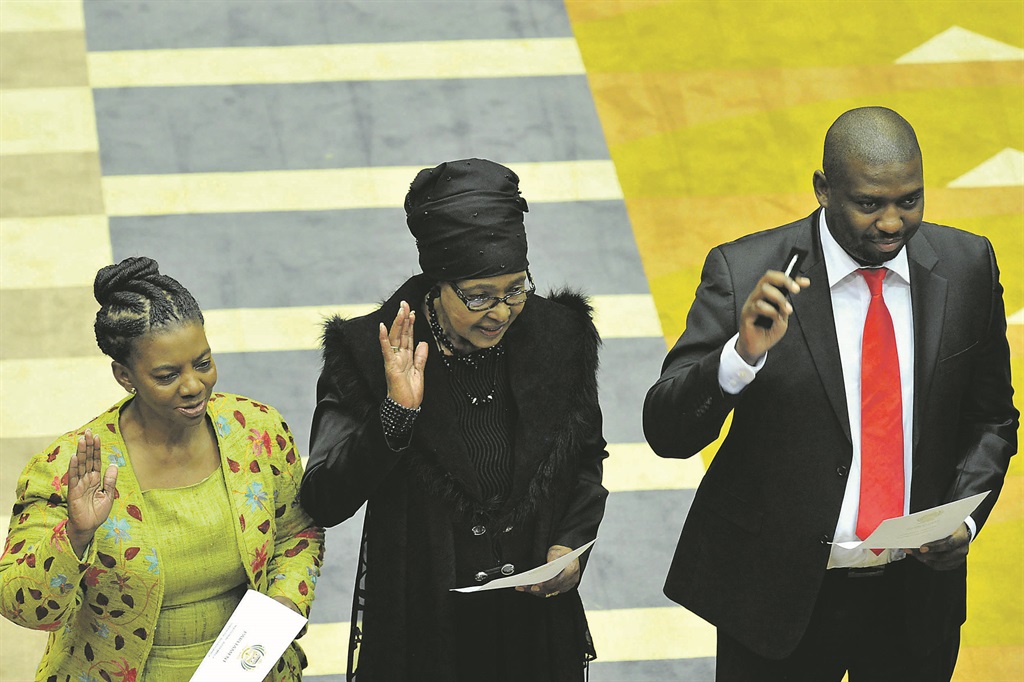
Winnie Madikizela-Mandela wasn’t quite in for the protocol, staged oversight visits and motions that MPs are expected to table in Parliament as part of their work. She had her own way of doing things.
When a clinic in Gugulethu turned away an ill woman brought in by her husband in a wheelbarrow, Madikizela-Mandela rocked up in the aftermath and read the nurses the riot act.
This week, Mbizana Mayor Daniswa Mafumbatha revealed that after Lumka Mketwa (5) died in a pit latrine at her school last month, Madikizela-Mandela called and offered to help build toilets in the rural town.
Madikizela-Mandela was rarely seen in Parliament, where she remained a member until her death this week. She was so notorious for her absenteeism that in 2002, then chairperson of the joint standing committee on defence, Thandi Modise, said: “I didn’t know she was a member of my committee”.
Modise was reported saying this to journalists when confirming that Madikizela-Mandela had not attended a single committee meeting in more than a year.
Only two weeks before her death, the National Assembly extended her leave of absence by nine months due to ill health, as it had done several times in the past two years, a requirement of the new rules for the House to approve leave if an MP was absent for more than 15 consecutive sitting days.
Madikizela-Mandela was first elected to Parliament in 1994 and appointed deputy minister of arts, culture, science and technology in the government of national unity.
President Nelson Mandela fired her the following year for a range of misdemeanours, including an unauthorised trip abroad using her position to foster the interests of her daughter, and using state vehicles without authority. Madikizela-Mandela remained an ANC MP, occupying the back benches for eight more years.
While she was seldom seen in Parliament until her resignation in May 2003, which followed her sentence by the Pretoria Regional Court to five years in jail for fraud – later reduced to three years and six months on appeal – Madikizela-Mandela had a colourful record in the legislature. In 2002, Parliament’s joint ethics committee found she had not disclosed around R50 000 a month in donations, and financial interests in the Mandela Family Museum in Soweto. It ordered that she be reprimanded by the Speaker of the National Assembly, and pay a fine equivalent to 15 days’ salary for failing to disclose the information in the register of members’ interests.
At least twice, Madikizela-Mandela snubbed the special panel set up by the committee to investigate allegations against her, and instead submitted a backdated doctor’s certificate to explain her absence.
She returned to Parliament in 2009 when she was elected in the top five of the ANC’s national list for the National Assembly. On May 6 that year, at the first sitting of the National Assembly to elect the new president, she nominated Jacob Zuma for the position, a man she described as “a capable leader of our people’s determination to prevail over whatever obstacles there may be”.
“Many names and descriptions have been used to characterise him, and the bookshelves have not witnessed the last of perspectives about him. But, as Shakespeare would write in Romeo and Juliet, ‘What is in a name? That which we call a rose by any other name would smell as sweet.’ Our people have democratically concurred,” she said.
But Madikizela-Mandela would spend even less time in Parliament than before, failing to meet her parliamentary obligations – which included holding Zuma to account – and she was not there to shield him from scrutiny, as many in the ANC benches did during the tumultuous Zuma years.
As her health deteriorated so did her attendance record. In the early years of her return to the legislature, she would attend the annual state of the nation address. One year she snubbed her own seat in the chamber and instead sat in the public gallery.
The ANC defended her absence every time, saying her schedule was designed in a way that allowed her to fulfil her parliamentary constituency and other social obligations characteristic to a person of her stature.
Records by the Parliamentary Monitoring Group show that since May 2014, Madikizela-Mandela attended only two oversight committee meetings. The first was in March 2015, when the public accounts committee dealt with large amounts spent on consultancy services in the department of defence. She suggested that departments work with the labour department to minimise the use of consultants.
The second was a week later. The standing committee on public accounts met with the department of international relations and cooperation to discuss the financial statement of the African Renaissance Fund, and to interrogate the department’s annual report. In that meeting, MPs raised concerns about the fund being described as a “slush fund”, the nature of payments made from it and the lack of controls. Madikizela-Mandela is quoted as insisting the Head of Mission in Ghana be told to pay back the money.
 |
| ||||||||||||
| |||||||||||||




 Publications
Publications
 Partners
Partners








